- Home
- Lynne Truss
Making the Cat Laugh Page 6
Making the Cat Laugh Read online
Page 6
Pretty loud warning signals, really; but she was late for a plane, so took a quick mental inventory of sexually incriminating material and decided to risk it. On holiday (with me), she fantasized (with my help) that her house-sitter was currently waltzing around the living-room dressed in her most expensive evening-frock, boozing direct from the bottle and leafing through her teenage diaries. She never discovered whether this alarming picture had any basis in reality, but when she asked him ‘How was your stay?’ he replied, ‘Well, it did fill a few gaps.’
Having just popped out to see the herbs again, I can announce that a variegated sage has now turned peaky (‘The drink, the drink – I am poisoned’), and my sense of failure is complete. It occurs to me belatedly that the friend who cat-sits for me when I go on holiday makes a point of spending ‘quality time’ with my cats, watching their favourite snooker videos with them and shouting at The Archers in a plucky imitation of me. I should do something similar with the herbs. After all, I know that my friend listens to Radio 3 and reads the Independent. An hour each day in their company, then, with the wireless blaring, and with me pretending to read her newspaper (exclaiming ‘Swipe me, how pompous’ in an authentic Indie-reader kind of way) might set them on the road to recovery.
Meanwhile I have started to wear my keys on a girdle, in the fashion of a Victorian housekeeper, shifting it from side to side on alternate days, to prevent curvature of the spine. I have always associated keys with the getting of wisdom, but since unlocking things seems to scare me so much (I lock them up again as quickly as possible) perhaps I should stick to the road of excess, instead. It is not much of an insight to boast of, in the end: that acting bored by the Independent might save the life of a flat-leaf parsley.
Having never given a second thought to the practice of diving into cinemas on the merest whim and spending two and a half hours in blissful solitary communion with a large screen and a sack of Opal Fruits, I was rather alarmed to discover recently that some of my friends think this marks me out as a desperate case.
‘I went to see The Fisher King on Wednesday,’ I announce cheerfully. ‘On your own?’ ‘Er, yes.’ ‘Oh dear,’ they say, and catch up my hand for a bout of sympathetic patting and smoothing. ‘I ate two boxes of Fruit Pastilles,’ I add hurriedly. ‘Boy, you should have seen my tongue afterwards!’ But they continue to shake their heads, with tears in their eyes. They think it is awful.
There is a stigma attached to it, you see; an atavistic idea that a woman sitting alone in a cinema is a woman self-evidently abandoned to the black dog of depression, and therefore a proper cause for public concern. Does this attitude reflect a rather deep, dark prejudice against the idea of women enjoying their own company? It is possible.
The real point is that I never, in any case, feel sorry for myself in a cinema. If you want to feel miserable, there are many more surefire ways of achieving it, after all: sit in a doorway with a homeless person; lean over a parapet on Waterloo Bridge and gaze into the mesmerically choppy waters; go and see how long Starlight Express has been running. The impulse simply to buy a ticket and sit comfortably in a dark public place of entertainment seems by comparison a whoop of life-affirming joy.
What I like is the feeling of sanctuary. Hugging my possessions to my chest, sinking low in the seat, and prising great juicy wads of Opal Fruit away from my molars, I feel tremendously comforted by the reflection that I have vanished off the face of the earth; nobody has a clue where I am. The phone won’t ring; motorcycle messengers cannot pursue me. If it didn’t cost £6.50, it would be like stepping through the wardrobe into Narnia. As I huddle down, and prepare to sneer at the now excruciatingly familiar advertisements, I like to imagine that my friends are all ringing each other in panic. ‘She’s gone to earth again.’ ‘Damn.’ ‘Now there’s nothing we can do but wait.’
In old movie thrillers, of course, outlaws on the run frequently took refuge in cinemas. They would stoop as though entering church, shiftily taking aisle seats and removing their hats. They pretended to watch the picture, but kept a constant eye on the door, waiting for the inevitable pair of mackintoshed cops to appear, asking questions of the usherette. For them, the cinema was only a temporary haven; for me, it is total. While I may sometimes feel like a criminal, for instance, I have never yet been obliged to shoot my way out of an emergency exit after watching half a reel of the film.
But what is the alternative, anyway, to going alone? It is to go with other people – and are you telling me this is preferable? How many times has one agreed, casually, ‘Hey, let’s do a movie!’ only to discover that one’s good friend Mike has never been properly cinema-trained? Me, I like to concentrate on the film; but for the universal Mike the cinema is a place where people are mysteriously quiet and sober-sided, where they have forgotten the value of voluble free-association, and need to be reminded of it. He is a restless kind of guy, and chatty. I mean, is this a funeral, or what?
‘Doesn’t that bloke remind you of Phil?’ he will chuckle loudly, briefly standing up to point at Mickey Rourke. I ignore him, of course, and bite my scarf, hoping that my explicitly hostile body language will tell him to shut up. It doesn’t. ‘Remind me to tell you later what Phil said at lunch-time,’ he adds, with an exaggerated nudge to the ribs. ‘It was such a scream.’ He then performs a nonchalant spot of overhead juggling, using a Malteser, a carton of Kia-Ora and a fully extended umbrella.
On really bad days, moreover, it transpires that Mike also suffers strange lapses of concentration, rendering him incapable of following plot. ‘What happened to the blonde girl?’ he suddenly enquires, at a moment of maximum plot interest. ‘Lynne, what happened to the blonde girl?’ he repeats a little more loudly, thinking I haven’t heard. ‘She died,’ I whisper back through clenched teeth. ‘Really? When?’ he asks. At which point I start to look round for the manager.
I suppose the tragic image of the single person in the cinema derives from the idea that they can’t have any friends. Perhaps it is time for this assumption to be overturned – since it is more likely, in my opinion, that the lone cinema-goer is simply attempting to preserve the few friendships she has still got left. Personally I associate the plush seat and the bag of chews with nothing other than pleasure and freedom. For me, the really tragic aspect of cinema-going is to hear people say, ‘Oh yes, I wanted to see JFK, but unfortunately I couldn’t persuade anyone to come with me.’ That’s so sad.
I have started getting a bit peculiar in Sainsbury’s. I knew it would happen eventually – that I would stop being Little Miss Reasonable at the check-out, and start getting verbal. ‘There’s no point, you know,’ I say, waving my hand in the face of the woman on the till. ‘There’s no point checking these things through so fast, because I can’t possibly pack them at the same rate.’ She nods, but takes no notice; just sets her jaw and carries on rolling tins down the conveyor belt three times a second, in a manner reminiscent of a thousand infernal-machine scenes from Jerry Lewis and Jacques Tati movies.
I always buy the same things in supermarkets: multiple tins of cat-food, multiple pots of hummus, multiple rolls of swing-bin liners. Take my advice: if you are the teensiest bit neurotic – can’t cope with all the choices in the modern world, check all the taps twelve times before answering the phone, won’t speak at dinner-parties until someone has said the word ‘badger’ – then shopping feels much less dangerous if you don’t give any consideration to what you actually want to buy.
Cat-food, hummus, bin-liners; cat-food, hummus, bin-liners. I exercise an astounding degree of self-control in this respect, though on every trip I also give myself seven minutes for open-mouthed wonder, as I stand in front of the biscuit displays, eyes all aglow, and look at the lovely, lovely things that can be made by simply rubbing together fat, sugar and flour. When my seven minutes are over, I ritually push my trolley past temptation, and have a little sob by the free-range eggs.
The reason I’m going into all this is that I recently had a bit of a s
hock in the bin-liner department. There I was, feeling safe inside my routine, repeating to myself, ‘Cat-food – yes; hummus – yes; bin-liners …’ and scooping an armful of boxes into my trolley, when I noticed a little yellow ‘flash’ had appeared on the side of the box. ‘ NEW,’ it said: ‘ MULTI-PURPOSE.’ In my confusion I dropped the lot. Staggering slightly, I reached out for support, and knocked some roasting-bags and double-length cling-film onto the floor as well. I tried to calm down by humming Lillibullero and sucking a tranquillizer, but it did no good. Should I climb up on top of the fitment and signal for assistance? What did it mean, ‘Multi-Purpose’? What possible other purpose can there be for a bin-liner than to line bins? Had Sainsbury’s brought out a ‘Josceline Dimbleby Book of Bin-Liner Cookery’?
I don’t like it; I don’t like it at all. I always thought I knew where I was, knew what I was getting. Of course, I have used some of these so-called multi-purpose bin-liners. And of course they work just as well as the old Uni-Purpose kind ever did. But a sense of certainty has been lost now, that can never be restored. I daren’t go back, not now. What if they’ve printed ‘Not for external use’ on the hummus, or ‘Non-drip’ on the Whiskas?
It’s official. It was in the paper on Saturday. The reason women make good spooks (or employees of the secret service) is that they can deflect awkward personal questions, especially over dinner. ‘So what do you do?’ they are asked, routinely. And instead of excitedly blurting out the latest list of arms-deal catastrophes, they cleverly feign a suppressed yawn and say, ‘Me? Oh, nothing. I have a boring desk job at the Ministry of Defence. Paperclips, that kind of thing. Dust, Turkish carpet, Cup-a-Soups, nine to five, calligraphy, tea-trolley, cheese rolls, Argos catalogue, Club biscuits.’ These MI5 women are masterly at it, obviously. I imagine them left out of the general conversation, eating, listening. And whenever the talk threatens to veer back in their direction, they just mutter ‘paperclips’ again, and it’s gone.
Men, on the other hand, tend to give the game away. Asked the same question, a man will evidently suck his teeth thoughtfully, smile into the middle distance, and then hoarsely whisper, ‘Ooh, sorry, I’d love to, but classified, careless talk, Brixton, Circus, say no more’ – at which everyone promptly stops talking or eating, and someone drops a fork. In the ensuing silence, he pretends to change the subject. ‘Did you say you’d been to Prague for a holiday? Funny, I was once shot in the leg in Pr—.’ He stops, looks around. ‘Whoops, ha ha,’ he jokes, ‘No, but really let’s talk about you and your allotment, I’m sure it’s much more interesting.’
On Saturday, when this intriguing gender fact was first revealed, I have to admit I was confused. I always thought it was the other way around – that women talked openly (in my own case, compulsively) about their jobs, and that men did not. Well-mannered men, in particular, often refuse so obstinately to divulge their occupations – either they consider it impolite to boast, or they think you should know without asking – that you can sit next to a chap for hours, wildly demonstrating the special effects in Jurassic Park (complete with roars, thumps, tussles and realistic squirts of ketchup), before finally discovering that he’s controller of Radio 3, or married to the Princess Royal. Sometimes you don’t find out until it’s too late to apologize. ‘That was the Primate of All England,’ someone will say to you at a party, nodding at your new friend as he wanders off, scratching his head. Numbly, you sink to the floor with your fingers in your mouth. You just asked him to take you dancing.
But what impresses me most is the thought of those high-powered women heroically pretending they wear slippers in the office. How do they cope with the follow-up questions? Or is it really true that if you say the words ‘boring desk job’, people will enquire no further?
I remember an alarming moment from an innocent girls’ night out in Twickenham, when I came out of the Ladies to rejoin the little group of rugby fans we’d met (what larks!), and bumped into my friend, menacingly lying in wait. ‘Stop saying you’re a journalist,’ she hissed, with the veins curiously sticking out on her neck. ‘Why?’ I said, jumping backwards. ‘Because it scares off the blokes. Tell them you’ve got a boring desk job.’ I was stunned. ‘I can’t,’ I said. ‘What if they ask a supplementary question?’ She glared. She fumed. She danced on the spot. ‘And trust you to use the word supplementary!’ she barked, before barging through the swing door with a mighty shove from the shoulder.
I realize I could never be a spook. Not just because I would betray secret operations by careless dinner-party chat, but because I consider the invention of alter egos a dangerous practice. Surely it’s hard enough being one person, without deliberately trying to be two. In order to keep saying ‘boring desk job, oh yes, boring desk job’, you would have to believe in it so completely – the Tube journey, the green triplicate forms – that surely one morning you would wake up and find it true, like something blackly paranoid out of Kafka, even down to the Club biscuits. The horror! ‘Help me, someone, I worked for MI5, and now I have a boring desk job!’ you would yell, but no one would listen. ‘But you always had a boring desk job,’ they would say, with narrowed eyes, like conspirators. ‘Or that’s what you always said.’
The demise of the Protein Man of Oxford Street last week, at the age of seventy-eight, came as a bit of a shock. Not that I knew him, of course; it’s just that in common with millions of Londoners I felt I had a vague idea what he had on his mind – mainly because it was written on a placard in big white letters immediately above his head. I apologize if you don’t remember him.
How one hates, in a national newspaper, to strike the pose of the metropolitan bore (which reminds me, aren’t they rude in Groucho’s?); yet the ever-present solitary figure in the jostling shopping crowd with his flat cap and specs, his placard, and his deeply peculiar message – LESS PASSION FROM LESS PROTEIN – so far resembles a universal archetype that, as a Londoner, I can hardly believe Stanley Owen-Green just wore a groove in the dusty pavements of Oxford Street for twenty-five years, with outings to Putney Bridge for the Boat Race. Perhaps it helps to say that, like Zelig in the Woody Allen film, the Protein Man was present in every black-and-white picture of London crowds that one has ever seen.
The point about Mr Green was that he was against protein. I emphasize this because although he devoted the last third of his life to carrying a placard above his head, and possibly sleeping in an extra-long bed to accommodate it at nights, he did not make it easy for the average foreign shopper, stooped under the weight of cheesy meaty nutty food purchases from Selfridges, to understand immediately what he meant.
At the same time as spreading dietary awareness Mr Green also engendered considerable semantic unease, because for twenty-five years one could frown at his splendidly unpunctuated message, ‘Less fish meat bird cheese egg peas beans nuts and sitting’, and somehow miss its drift. ‘What exactly is your beef?’ one might have asked him, hilariously, if one had only thought of it.
When Stanley Owen-Green started this anti-protein campaign in 1968, of course, food was not generally accepted as the enemy within, the way it is now. Devil-may-care people did not quip: ‘I never met a carbohydrate I didn’t like,’ mainly because nobody would tumble the joke. In those crazy far-off days of prelapsarian ingestion, we bunged all sorts of things in our cake-holes and simply hoped for the best.
The idea of ‘Protein Wisdom’ in the late Sixties was revolutionary, therefore. Mr Green sincerely believed that too much ‘married love’ could kill, and that the way to banish its excesses was to reduce one’s intake of fish meat bird. One only hopes he never popped into a picture palace to see Marco Ferreri’s film Blow-Out, in the mistaken belief that it concerned the perils of Formula One.
But the trouble was, his placard was double-edged, both literally and metaphorically, and open to misuse. Ironically, those who positively embraced the notion of swooning unto easeful death sated with lust (not to mention nuts peas beans) knew from Mr Green’s placard precisely which pass
ion-packed items to add to their shopping lists.
What impressed everyone so much about Mr Green’s campaign, however, was not its faultless logic but its sheer constancy. After twenty years or so, a chap with a popular message might be expected to paint a new sign, take a new angle, jazz up the slogan; but Mr Green seems never to have done so. ‘Less passion from less protein’ was good enough to begin with, and good enough to end with, too.
Early reports suggest that the Museum of London will display Mr Green’s placard, which is absolutely right and proper. By rights, I feel, he ought also to be inserted retrospectively into the works of Dickens. Thus, the last tremendous bustling-street sentence of Little Dorrit would read:
They went quietly down into the roaring streets, inseparable and blessed; and as they passed along in sunshine and in shade, the noisy and the eager, and the arrogant and the froward and the vain, and that man, you know, with the ‘Less Passion from Less Protein’ sign above his head, fretted, and chafed, and made their usual uproar.
Fish have rights, you know. I learned this important piece of information last week as I was innocently travelling up an escalator at Tottenham Court Road, where aquatic matters are arguably furthest from a person’s mind. But there it was, one of those little hand-written labels that fanatics attach to the posters; stating it quite plainly, ‘Fish Have Rights’. Of course I laughed out loud – rights to what? fair trial? freedom of expression? abortion on demand? – but then stopped, confused. I mean, perhaps ‘Fish Have Rights’ was a joke. Or maybe it was the name of a really famous pop group. Worse, perhaps it signified nothing at all, but had been written by an unreconstructed surrealist, to see whether the word ‘fish’ in peculiar contexts still made people feel vertiginous and paranoid. In which case, I reflected (as I grasped the moving handrail for support), the experiment appeared to be working.

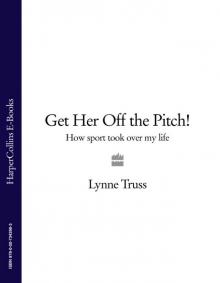 Get Her Off the Pitch! How Sport Took Over My Life
Get Her Off the Pitch! How Sport Took Over My Life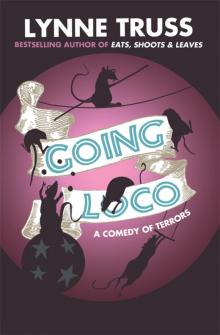 Going Loco
Going Loco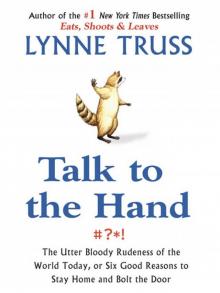 Talk to the Hand
Talk to the Hand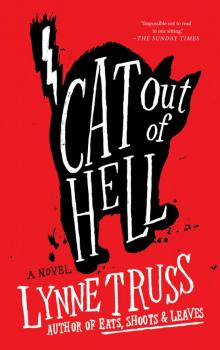 Cat Out of Hell
Cat Out of Hell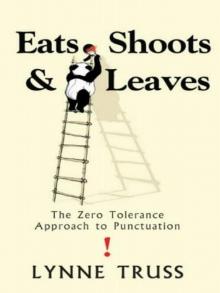 Eats, Shoots and Leaves
Eats, Shoots and Leaves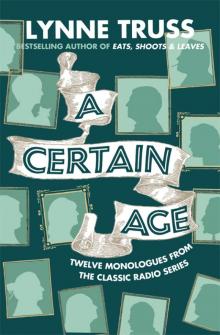 A Certain Age: Twelve Monologues From the Classic Radio Series
A Certain Age: Twelve Monologues From the Classic Radio Series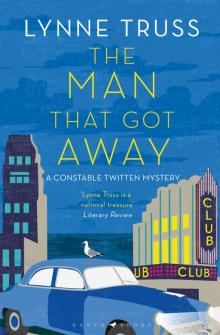 The Man That Got Away
The Man That Got Away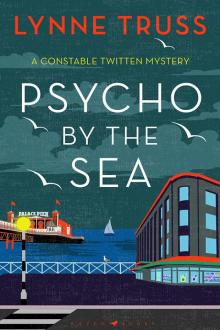 Psycho by the Sea
Psycho by the Sea With One Lousy Free Packet of Seed
With One Lousy Free Packet of Seed Tennyson's Gift: Stories From the Lynne Truss Omnibus, Book 2
Tennyson's Gift: Stories From the Lynne Truss Omnibus, Book 2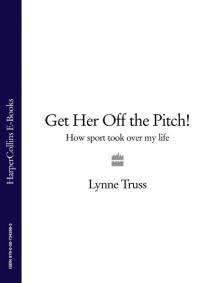 Get Her Off the Pitch!
Get Her Off the Pitch! Tennyson's Gift
Tennyson's Gift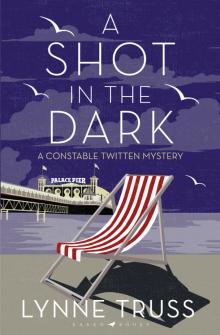 A Shot in the Dark
A Shot in the Dark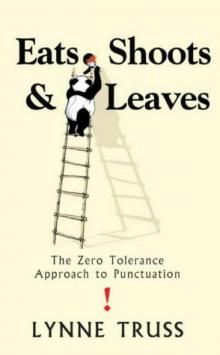 Eats, Shoots and Leaves: The Zero Tolerance Approach to Punctuation
Eats, Shoots and Leaves: The Zero Tolerance Approach to Punctuation